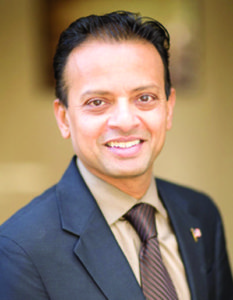
SATYAGRAH SOULS is a monthly political series presented by Silicon Valley’s community leader, Saratoga Councilmember Rishi Kumar, in highlighting the community involvement and success of Indian Americans in the United States. This series seeks to inspire us in giving back to our local community. We Indian Americans are going through a transitional evolution, as we get entrenched in a new world, embracing new culture, exerting zealous work ethics, supporting the American economy as entrepreneurs, high tech geeks, doctors, lawyers and more. We are definitely imposing the positive intentions and good citizen values upon this fantastic country and making a huge impact. But can our involvement run a bit deeper with issues near and dear to our hearts, perhaps within our local city, or with the local public school that our children attend? Do we sometimes hear our conscience imploring, “Am I doing enough?” Yes we can get involved just a bit more, push our comfort zone and enhance the learning and impact our involvement. Our involvement can simply start with developing a healthy curiosity in our local community, instead of being ‘busy’ bystanders. Once we get involved, we will quickly discover, how easy it is for us to make progressive change happen and how receptive everyone around is, to leverage our skills for it. There are leaders waiting to be discovered, why not “me”, by taking that first step? The give-back experience can be freeing, energizing – personally rewarding and transformative at the same time. There are many who have made their mark in doing just that. With this monthly series, we want to highlight these Satyagrah souls who are showing us the path. Here is a Satyagrah soul, who has found the calling…
****
The first Indian American Legislator in Colorado
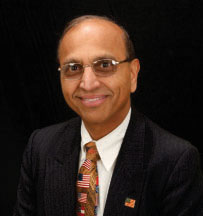
State Rep. Janak Joshi is a retired physician, grassroots activist and resident of Colorado Springs for more than 38 years.
Rep. Joshi was elected to the Colorado House of Representatives in 2010 and served until 2016. He is the first member of Indian origin to be elected to the Colorado Legislature. He has served on Education, Finance, Health and Appropriation Committees. He is the Ranking member of the Health, Insurance and Environment Committee.
Rep. Joshi brings a wealth of expertise in health care policy and small business. Rep. Joshi ran a practice in Colorado Springs for 30 years specializing in Internal Medicine, Nephrology, and Occupational Medicine. He was a small business owner of medical clinic and dialysis centers and employed as many as 50 people.
Rep. Joshi came to the United States 37 years ago with a dream, a suitcase and $100. He wanted to keep this dream alive for all our children. Rep. Joshi has been very involved in his local and the medical community. He has worked with Crime Stoppers, American College of Physician Executives and the American Medical Association.
Rep. Joshi is also an international health care policy expert, especially on the policies of Germany, England, Spain, Netherlands, and former Soviet Union.
He has been married for 41 years and is the father of two daughters and is a grandfather.
*********
Political empowerment can be in many forms
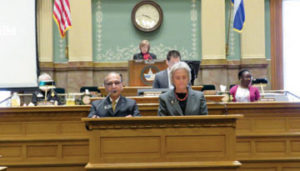
Janak, we are so proud of you. You are the first Indian American Legislator of Colorado. Many states with a more populous Indian American population have not achieved that yet. How did that happen in Colorado?
When I moved to Colorado 37 years ago, there were very few Indians here. Colorado Springs has increased its Asian population but it is still very small. Even though the State is purple now, my district is Republican leaning. I had registered as Republican since everyone I know was too. One thing led to the other, I became active in the party. Eventually became grass root activist and ran for City Council. I lost that election but other activists came to know me. After I retired from medical practice, I was encouraged to run for State office. I was endorsed by the retiring Senator & the State Representative which helped a lot. I won the race in 2010 uncontested. So I would say yes, the ethnic mix helps, but ultimately how much involved and known, you are both socially & politically, makes all the difference.
From being a medical professional to now a “career politician”. Describe to us the morphing and the reason for the switch. Did public service turn out to be what you expected?
I was addressed as Doctor Joshi and am still being addressed as such. So I would say my morphing to a “Career Politician” has not occurred yet. I like that. I still consider being elected as giving back to my community. However eventually people do see you as a politician. There were times when the bills required a “NO” vote, that as a physician, I might have said “YES”, and those were the hardest decisions. Regardless, public service is very humbling experience. When I look at the pictures of State Legislatures from last hundred years in the Capital, most of them, no one remembers. That is a real eye-opener, but still you are part of the history.
Campaigning is a key component of running for office. Sometimes the story is good and sometimes the
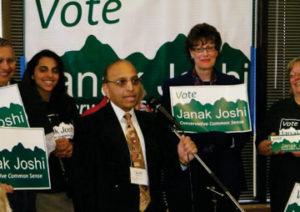
story not as good. Any specific ideas for our readers on how to run a great campaign?
Campaigning is a very unique experience. Unless you have been a candidate, there are no short cuts to that. Every campaign has good, bad and ugly. When your name appears on the first page of the newspaper in not so nice a way, that is the hardest day for every candidate. You have to accept that as a way of the candidate’s life. But that is even harder on your family and friends. That is why many qualified people do not run for public office. Every little thing about your personal life will become public. My advice to anyone thinking about running would be to prepare for worst. Saying that, you can emphasize on your positive side, your ethnic background, qualifications and community service. You should have supporters who would defend you against the attacks while you can campaign on issues. Above all make sure your family is in, one hundred percent.
As you look back at your 3 terms as a legislator in Colorado, what are some of the highlights?
When I was elected in 2010, healthcare issues were in the forefront. With my healthcare background, I was able to navigate and also help my colleagues through it. It took me a while to learn the legislative process. Now it is easier. I also know some of the history behind each bill.
I have sponsored a bill that is “Right To Try”. This bill allows terminally ill patients to request a drug that is still in trial but has been beneficial. FDA can give the drug before its final approval. It PASSED unanimously. Colorado was the first State to pass. Now 31 States have passed it. It was also included in the Republican Party platform at the July 2016 convention.
I have sponsored a Resolution honoring Mahatma Gandhi. Colorado is the first State to do so. During the introduction and passage of it, Consul General of India, Houston and many community leaders were present in both Chambers. The priest from the Hindu Temple said the prayer and “Vaishnavajan…” was recited in the House of Representatives.
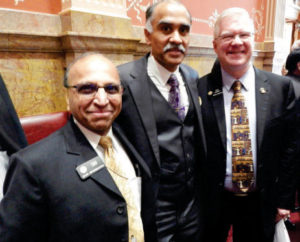
As a community, what are you doing to get more Indian Americans elected to office in Colorado?
The Indian Community in Colorado is relatively small. Most of us are professionals. We are still mostly socializing within our own communities. We have many “factions”, so we do not participate directly in the political process. Since I have been elected, we have seen some “coming together” at Indian community meetings. People are curious and asking questions about the political process. I have invited children to recite the pledge of allegiance to the House at the Capital. I have brought other elected officials to the temple festivals. I am looking into starting PACs, Small Donor Committee etc. so we can help other Indian candidates financially.
You were at the India Parade in California. Describe to us your experience?
I was fortunate to be part of the celebration at the India Day Parade in Fremont. I was overwhelmed by the enthusiasm and participation by the Indians as well as other local communities. It was very well organized. My salute to organizers like Dr Japra and Rishi Kumar. I met so many friendly people. They all waited for the full parade in hot sun. The stalls with food and other items were amazing.
It seemed to me that we still miss our ethnic heritage. Events like these fill that void. It also reminds our children and grand-children about their heritage. The floats gave them the glimpse of it. I enjoyed it so much that if invited, I will keep coming back and hope that the parade will be bigger and better next year.
Is political empowerment important for the future of our Indian American community in this country?
Most of us will be American for eternity. This is our home now. This is the future for our next generation. We have to be involved not just socially and professionally, but politically too. If we are going to defend our religious liberty, ability to teach our children about our ethnic heritage etc. we will have to engage politically. That does not mean that all of us have to run for political office. Political empowerment can be in many different forms. One can be an activist for a particular cause. Another person may get involved in a campaign or a party organizer. We have to encourage our children to get engaged in schools and colleges. They can run for student associations or clubs. These could be Rotary Clubs, Chamber of Commerce, School Boards etc.
Once you learn about the system, help and support the candidates. It only takes few hours a month or so, but will have long lasting effect.
What advice do you have for the young Indian American who is inspired by your leadership? How should they get going?
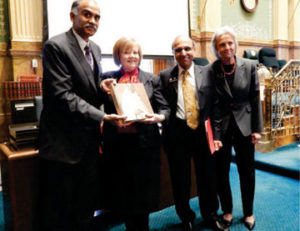
to the Speaker of the House, Dickey Lee Hullinghorst while Rep
Janak Joshi looks on
In Colorado where Indians are really a ‘minority’, I have found youngsters are very intrigued by me in the State House. It is very intimidating just to be in the Capital. When I invite these young citizens to the House Floor, they get very excited. I have invited them to recite the Pledge of Allegiance that we do at the beginning of each day. They feel very privileged to have a certificate and picture with the Speaker. I advise them and their parents to not be intimidated by the big dome of the Capital and to volunteer in the offices of their elected officials. If interested they can work as legislative aides. They should volunteer in campaigns.
One of our daughters did exactly that. Long before I was elected, she worked as an intern for a congressman and legislative aide. That helped her with her Graduate School admission. I am proud to say that recently she received Boren Fellowship to go to Mozambique and Fulbright Scholarship to go to Brazil next year.
Anyone who wants to do this, I will be very happy to talk to them and guide them through it.
Janak thank you! We wish you success with all future endeavors.
****
Dear Readers, Do you have a story to share? We invite you to introduce us to folks in your community who are making a difference – we would love to profile them. Are there similar stories you are familiar with locally. The ones who helped address a simple issue in the community to make life a bit better. Perhaps someone you know decided to make a run for school board, was appointed to the planning commission. Provide us your insights on Indian Americans locally and nationally who are making things happen. These perspectives will help construct roadmaps for our community to empower ourselves, to hopefully ignite a desire in all of us to represent our local communities as doers, leaders, establish and entrench ourselves in this glorious country of America and help make it a better place
***********
ABOUT RISHI: Rishi is an elected city councilmember in Saratoga, CA and politically active in the state of California, he continues to follow his passion for community service, seeking to provide services to his citizens cheaper, faster and better, making a difference. Rishi has community outreach and engagement a key focus for his political leadership. As Saratoga’s community organizer, Rishi is host of many community events in Saratoga, many of which are free and always inclusive usually addressing a need or a cause. Rishi’s day job is as a Silicon Valley hi-tech executive but his zeal for community service effervescent. Rishi is also the President of the Bay Area Indian American Democratic Club (www.baiadc.org) whose charter is to further the interests and values of Indian Americans, work towards political empowerment and advance ethical standards in the political system. You can reach him via his website www.RishiKumar.com.






